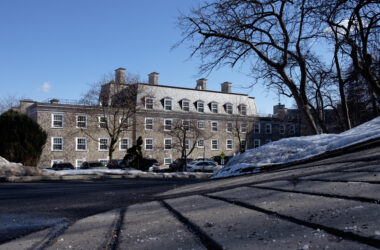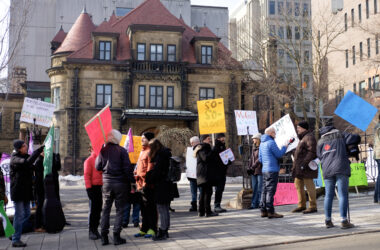Dalton McGuinty and the Liberal Party of Ontario won their third consecutive Provincial election last Thursday night, clinching victory despite Ontarians’ preference for Conservative Party candidates in recent federal and Toronto mayoral elections. The result marks McGuinty’s third term as Premier but only the first in a minority government, after handily winning majorities in 2003 and 2007.
When the polls closed, the incumbent party was holding at 53 seats, just one seat short of a third majority parliament. Both the Progressive Conservatives (PC) and the New Democratic Party (NDP) made gains, earning 37 and 17 seats, respectively.
Tim Hudak, running his first campaign as leader of the Ontario PCs, entered the campaign as the official opposition, and, at first, was polling neck-to-neck with McGuinty. The party’s platform focused on what he saw as Liberal tax hikes over the past eight years. A PC press release quotes Hudak saying: “Dalton always hikes taxes. And he never takes responsibility.” Closer to election day, his focus became the spectre of a NDP-Liberal coalition: “He will claim he has to hike taxes as the cost of doing a deal with the NDP.” The party emphasized what they perceived as government waste, and extraneous taxation on hydro.
The NDP made considerable gains by reaching out to middle-class voters concerned with their bottom line. Leader Andrea Horwath vowed to eliminate the harmonized sales tax on hydro and cap the salaries of hospital CEOs. As a near-majority government, the Liberals will need to rely on the support of one of the two opposition parties to pass legislation, considerably augmenting the influence of those parties in the legislature.
McGuinty’s re-election comes shortly after a major conservative victory in last May’s national election in Ontario ridings, as well as the recent election of fiscally conservative mayor of Toronto, Rob Ford. Despite the apparent inclination of Ontario voters toward Tory governance, Iopsis Reed polls during the election suggested that Ford’s presence hurt Hudak’s chances.
Kathleen Klein, president of Liberal McGill, said that voters sent a message to the Conservatives, and were still reeling from previous Premier Mike Harris’ public service cutbacks.
“Stephen Harper wanted to see the Greater Toronto Area go completely blue at the close of this election and his dreams have been trounced … Mike Harris’ so-called common-sense revolution is still too fresh in the minds of most Ontarians to make the mistake of electing Harris 2.0,” Klein said.
Despite a large contingent of Ontarians at McGill, many were unaware of the results of the election, or even that it took place.
“I should care since I’m from there, but I just don’t pay as much attention as I should … I voted in the municipal election here [in Montreal], but I don’t really notice what’s going on back home,” Amy Boekhoud, a U3 Art History student, said. The trend of low voter interest is not unique to McGill; voter turnout was at its lowest in 36 years. Less than half of eligible voters in Ontario cast ballots on Thursday.
“Our health care is still covered by our home provinces, our younger siblings are still affected by government-mandated curriculum [sic] in their classrooms, many parents are paid by the provincial government and are affected by changes in the economy, and many of us students hope to return home to jobs upon completion of our studies,” Klein said, in response to the lack of student awareness. For students in particular, the Liberal platform has several proposals aimed at reducing student debt, such as 30 per cent post-secondary undergraduate tuition grants, and a six month grace period on loan repayment for graduates who enter the not-for-profit sector.








